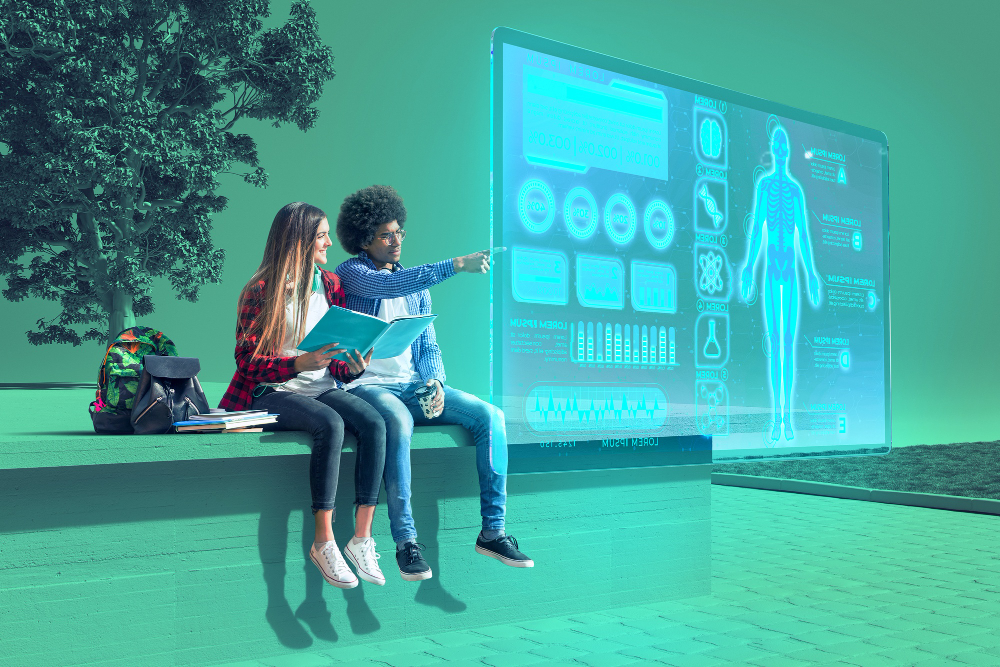It is now essential for technology to be integrated into many industries, and education is no different. Artificial Intelligence (AI) has become a disruptive force that provides creative ways to improve educational institutions’ efficiency. Artificial intelligence services are revolutionizing the way that education is managed and provided, from administrative automation to individualized learning experiences. We will examine the advantages and uses of AI in education in this blog article, as well as how implementing it can greatly increase educational institutions’ efficacy.
Introduction to Artificial Intelligence Services and AI in Education
Artificial intelligence is the term used to describe how technology, especially computer systems, can simulate human intelligence processes. Artificial Intelligence (AI) comprises a multitude of technologies, such as computer vision, natural language processing, machine learning, and more. AI has been more well-known in several areas in recent years, and its potential in education is becoming more widely acknowledged.
AI in education refers to the application of these cutting-edge technologies to improve instruction and student learning as well as the general administrative operations of educational establishments. The education sector’s operations might be streamlined and long-standing issues could be addressed with this unification.
Personalized Learning and Adaptive Education
Offering individualized learning experiences is one of the biggest advantages of using AI services in educational settings. Conventional classroom environments frequently find it difficult to accommodate each student’s unique learning preferences and speed. Education platforms with AI capabilities can evaluate student data, including test scores and interaction with materials, to customize instruction to meet the individual needs of each learner.
Artificial intelligence (AI) algorithms are used by adaptive learning systems to pinpoint problem areas for students and offer focused treatments. With the ability to dynamically modify the level of assignments and material, these systems guarantee that students are suitably pushed without experiencing a sense of overload. In addition to improving learning outcomes, this individualized strategy increases students’ motivation and engagement.
Efficient Administrative Tasks
Administrative issues at educational institutions range widely, from handling admissions and class scheduling to maintaining student data. A top education app development company stated that AI can automate and optimize processes to significantly increase task efficiency. For example, AI-powered chatbots can answer common questions from parents and students, freeing up administrative staff to work on more difficult problems.
By evaluating applications and identifying possible applicants based on preset criteria, AI can also help with the admissions process. As a result, institutions can make better decisions and spend less time and money on manual application reviews.
Smart Content Creation and Assessment
The development of instructional materials is being revolutionized by AI-driven content creation technologies. These resources can produce interesting and interactive content that suits various learning styles, like games, movies, and simulations. These materials can be used by educators to improve their pedagogy and give students a more engaging educational experience.
AI can also be quite helpful in automating the grading and assessment procedures. It can take a lot of time for teachers to grade a lot of assignments and tests. Multiple-choice questions can be swiftly and precisely assessed by AI-powered technologies, freeing up instructors to concentrate on offering insightful feedback on open-ended assignments that call for human judgment.
Data-Driven Insights for Educators
The analytical powers of AI are a blessing for teachers who want to learn more about their students. Education businesses also hire AI developers to build AI systems that can offer insights that help instructors decide on instructional tactics and interventions by evaluating data on student performance, engagement, and learning behaviors.
AI, for example, can spot behavioral patterns in students that may point to disengagement, enabling teachers to step in before things get out of hand. AI can also assist teachers in monitoring the efficacy of various teaching strategies and pinpointing areas in need of development.
Enhanced Student Support Services
AI-powered solutions can be used outside of the classroom to give students better support services. Digital mentors and virtual instructors can provide round-the-clock support by responding to inquiries and offering clarifications on a variety of subjects. This encourages a sense of self-directed learning in addition to helping pupils get past obstacles in their learning.
AI can also help pupils who are in danger of falling behind academically by facilitating early intervention. Through the analysis of several data sources, including test results, assignment submissions, and attendance records, artificial intelligence (AI) systems can recognize kids who may require extra help and notify teachers or counselors promptly.
Ethical Considerations and Future Challenges
Although there are many advantages to using AI services in educational settings, it’s important to address potential problems and ethical issues. Data security and privacy must be given high importance since AI systems need access to private student data. Institutions need to put strong safeguards in place to guarantee that data is handled sensibly and by applicable laws.
Finding the ideal balance between AI-driven automation and the human touch, which is frequently necessary in education, presents another difficulty. Even though AI can simplify administrative work and offer insights, educators continue to play a crucial role in promoting creativity, critical thinking, and interpersonal skills.
Conclusion
An important step toward efficiency, customization, and innovation has been made with the introduction of artificial intelligence services into educational institutions. Artificial intelligence (AI) has the power to completely change the way that education is provided and run, from tailored learning experiences and administrative automation to intelligent content production and student support services. Institutions of higher learning must adopt AI services provided by the Artificial intelligence development company, considering the moral ramifications and making sure the technology enhances the human element of instruction. Unquestionably, the potential of AI will play a significant role in education in the future, offering students everywhere a more productive, efficient, and enjoyable learning environment.

